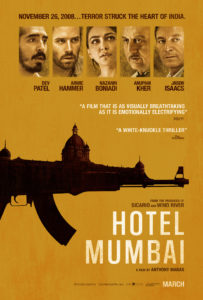Based on the terrorist attacks launched into Mumbai November 2008 Hotel Mumbai, is a taunt, emotionally draining film reliving those attacks from a very personal character oriented point of view. As with any narrative film that is ‘based on real events’ or a ‘true story’ it is important to understand that fiction film is a terrible way to learn anything about history. What really good historical film can do is capture the emotional reality of an event, a place, or a time, allowing audiences to connect as human beings to the people who lived though the depicted events and hopefully come away with a better and more empathic understanding of what those events meant.
With the exception of the Raj Hotel’s chief chef Oberoi, played  perfectly by Anupam Kher, the characters of the film are either entirely fictional or loosely combined from multiple sources however the characters themselves were not given and significant ‘Hollywood’ treatment and allowed to exist within a sphere of action that retained a strong sense of reality about them.
perfectly by Anupam Kher, the characters of the film are either entirely fictional or loosely combined from multiple sources however the characters themselves were not given and significant ‘Hollywood’ treatment and allowed to exist within a sphere of action that retained a strong sense of reality about them.
For those unaware of the history on November 26th 2008 a terrorist group, the Lashkar-e-Taiba, launched into Mumbai a series of murderous attacks. Arriving by boat they coordinated across 12 locations attacking crowds and landmarks with gunfire and explosives. The series of attacks lasted three days until November 29th when the last of the terrorists was killed. Killing 166 and wounding over 300 the Mumbai attacks represents one of the worst and most prolonged terrors incident. Lashkar, unlike many other Islamic-inspired terrorists organizations, held the belief that taking ones life by one’s own hands was always sinful but that dying at the action of the enemy was a path to martyrdom. These terrorists never intended to survive their operation and intended to kill as many unarmed, innocent people as possible before being killed by police or military. PBS’s Frontlinehas an excellent documentary from 2015 about the attacks and the critical role one American played in its planning and execution.
We witness the events of Hotel Mumbai through the eyes of several characters, Arjun, a waiter and devote Sikh played by Dev Patel, The married couple David (Armie Hammer) and Zahra (Nazanin Boniadi) who have arrived at the hotel with their infant son and his nanny (Tilda Cobham-Hervey) and Vasili a rough Russian played by one of my favorite actors Jason Isaacs. This is not a story of unarmed people taking heroic action to overpower armed evil men. It should be said that the violence of the movie is handled quite expertly; never so graphically as to numb the viewers nor so distantly that it ceases to have emotional weight. There are heroes in the story and there is great tragedy but it is not one of thrilling action set pieces but rather horrific encounters with unrestrained hate and violence. The terrorists murdered with remorse and witnessing the recreated events I was moved to hatred of the attackers, terror for the victims, and emotionally wrung out as no one in the film has a cloak of invulnerability provided by neat story arcs and act structures. The film works, it is a powerful piece of art that conveys an emotional truth about these events while staying in some areas of the historical record. For example the movie compresses events down to a single night instead of the protracted siege that took place at the Hotel Raj, but the film’s deviations from the records are not of the sort that would make the project into propaganda or empty honorifics.
I can heartily recommend Hotel Mumbai if you are the sort of person who can endure a film that uncompromising depicts evil and expects a lot emotionally from its audience.
